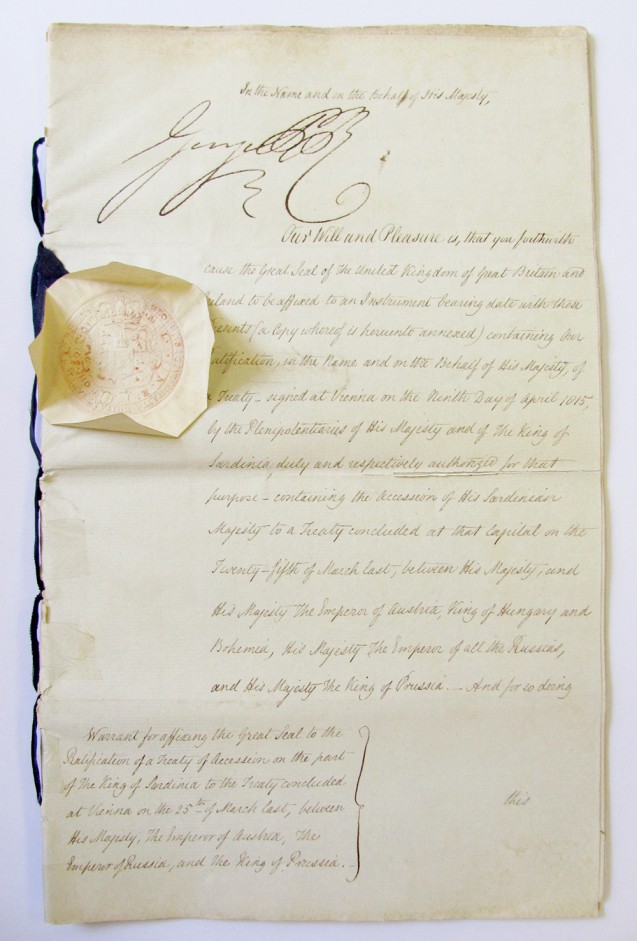Authentic copy bearing the Royal Seal of Great Britain, signed by the Prince Regent, (the future George IV) and the Britsh Foreign Minister Lord Castlereagh. In 1815, the whole of Europe joined together against France, in reaction to Napoleon’s escape from Elba. The result of this alliance would be the disastrous Battle of Waterloo. This document is Great Britain’s official copy, sealed by the Lord Chancellor (and Lord Keeper of the Great Seal), Lord Eldon.
State of conservation: Slightly yellowed paper, traces of humidity around the edges. The fold is fragile and slightly torn. Some previous consolidation with tape.
The news that Napoleon has left Elba dropped like a bombshell at the Congress of Vienna. After several meetings at which voices were raised, an agreement was reached by the powers still in discussion in Vienna, Russia, Prussia, Austria and Britain.
It was particularly severe with respect to Napoleon. On 13 March, plenipotentiaries of eight powers signed a declaration which affirmed notably that “Napoleon Bonaparte has placed himself without the pale of civil and social relations; and that, as an enemy and disturber of the tranquillity of the world, he has rendered himself liable to public vengeance”. The powers thereupon engaged themselves to “employ all their means, and unite all their efforts, so that the general peace, the object of the wishes of Europe and the constant purpose of their labours, may not again be troubled; and to provide against every attempt which shall threaten to re-plunge the world into the disorders and miseries of revolutions.” The whole of Europe was in league against one single man, a significantly rare event in world history.
This hurried declaration did not in any way slow Napoleon’s advance upon Paris. It was however followed by the protocol and treaty of 25 March, signed by almost all the countries of Europe, and in it it was laid down that Napoleon should be removed from power by force. This treaty, known as the Treaty of the Quadruple Alliance, had “no other aim but to support France, or any other Country which may be invaded, against the enterprises of Bonaparte and his Adherents”. A secret clause (not present here) specified that Britain agreed to pay for and equip any military operation designed to bring Napoleon down. The Treaty of 25 March was signed firstly by the main “Four Powers” mentioned above. The other second tier powers were then invited to adhere to the document without however being able to modify it. The copy here shows the engagement of the Kingdom of Piedmont Sardinia in the war effort. Between the end of March and the beginning of April 1815, all countries, great and small, followed the Sardinian example.
And so, after this agreement made by a Europe in coalition against the Emperor of the French, war was unavoidable. Indeed, the fact that the treaty envisioned the establishment of such huge military forces meant that Napoleon’s defeat was almost a foregone conclusion. A military disaster such as that of Waterloo could not be avoided.
Exhibitions : PARIS, Archives nationales -“Congrès de Vienne”-, 07/04/2015-30/07/2015


